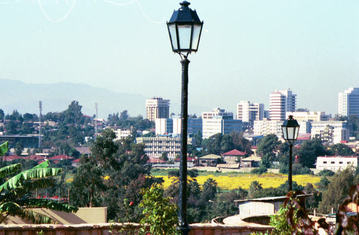
August 11, 2008
I have just returned from my first visit to continental Africa — to Ethiopia to be exact — and I have been trying to collect my thoughts, experiences, observations and reflections.
Although Ethiopia is quite different from Canada, it is not on another planet. The response of people when I announced that I was going to Ethiopia to visit my boyfriend (who is there on a law internship) revealed the impression, nonetheless, that I was leaving the galaxy.
These discussions exposed less about Ethiopia and more about the ways in which we learn about “other” countries — namely, through news clips.
But similar to the way in which one CBC headline cannot accurately capture Canada, no news headline could ever capture the incredible nation I just visited.
Ethiopia is one of the world’s oldest countries. The traditional dynastic reign began with King Menelik in 1000 B.C although the vicinity of Addis Ababa is where scientists believed humans first migrated from.
“Lucy,” as the fossils are named, represents the oldest remains of humans ever found, estimated to be 3.4 million years old. These fossils were found in the Ethiopia’s Rift Valley.
I cannot begin to describe the awe-inspiring sensations I felt as I toured Ethiopia’s National Museum and Addis Ababa Museum. I saw “ancient” as I had never seen it before. In the West, history is often taught as if the world “really” began with the Enlightenment — as if the “world that matters” is only 400 years old. Ethiopia was like historical kryptonite to this false notion.
The strength and the beauty of the African countryside really gripped me. Rolling mountains. Picturesque trees. Beautiful flowers. Patches of farmland between vast fields.
In between the rural cities and towns were small little collections of homes. Some straw. Some clay. Some stone. Most were small and circular in shape. Most of the people seemed to be involved in farming. It was all manual.
Donkeys were being used to till the fields. People were on their hands and knees picking crops. Everywhere, children were playing and working.
Like the capital Addis Ababa, the rural towns also had a heartbeat.
Road lanes were shared by minivans, mopeds, donkeys, street vendors, and kids playing soccer. A lot of the towns were largely dominated by open air markets, selling everything from gold to leather goods to clothes to freshly killed meat strung upside down.
And in true Ethiopian fashion there were coffee shops and caf?s everywhere. Coffee is so integrated into the culture and socializing that you cannot help but desire to stop at all of these places. And so I did.
Macchiato after macchiato. Coffee after coffee. In almost every restaurant or caf? there was a woman who roasted the coffee freshly over coals, straight from the raw green beans.
She would bring the coffee over to the table to allow the aroma to be sensed first. I relished the way incense would be placed on the table as part of the coffee ceremony as a way to enhance the sensory experience. One thing I noticed was there was no “take away” option anywhere. Coffee was meant to be enjoyed. Savoured. Shared with friends and family.
The poverty in Ethiopia was not the way it is often represented on television, where Africa is presented as some sort of never-ending desperation. Instead, it seemed to be woven into the society like a bright cloth, that never disappears, but isn’t always central.
Not everyone is poor.
The difference between here and there, however, is that there, poverty is never more than a few minutes away. You are never more than five-minutes walk away from a child who wants to wash shoes for any spare change you can give him. You are never more than five minutes away from a bone-thin pregnant woman who is begging for change for food. You are never more than five minutes away from a reminder of the inequality that cuts through this world.
But there is more to Ethiopia that its struggle with poverty. We think when we go to poorer nations we are “giving” to them in terms of aid money, medical donations, and aid workers. But this short-sightedness places us on a self-congratulatory pedestal that we do not need to be on.
Those in the non-Western world have just as much to give.
I know I left Ethiopia richer than when I arrived.
Ethiopians shared their culture, their history, their politics and their geography with me in ways that money cannot begin to measure. To reduce these nations to mere regions of poverty strips the people of their dignity and their equality to us.
We must celebrate this world, rather than divide it. We must learn about this world, rather than make assumptions about it.
And most importantly, we must keep an open mind and be willing to listen.
Everybody has a story to tell.
—
Brianne Bovell is a member of the Mercury’s Community Editorial Board.



























Approaching Ethiopia with the open-mindedness that you have displayed is the initial step to experiencing Ethiopia’s rich culture, that goes back to pre-historic times.
A very real and honest view of Ethiopia, you wrote here.
An exquisite and dazzling post from a first-time Ethiopia visitor. Enjoyed it.
Just beautiful!!!
I hope my first experience to Ethiopia will be as delightful as yours. Very well done.